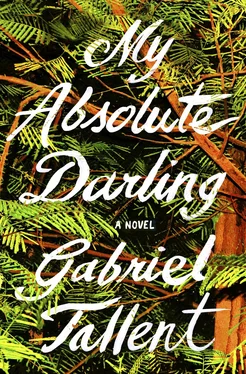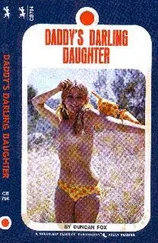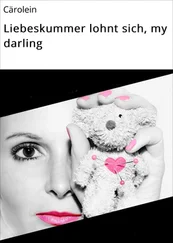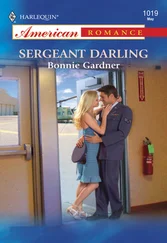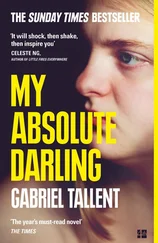1 ...6 7 8 10 11 12 ...89 Martin goes to a grinder bolted to the workbench and turns it on.
“No, wait,” Turtle says over the roar of the grinder.
Martin stands gauging the angle of the bevel by eye. “Fine,” he says, “it will be fine .” He passes the blade across the grindstone. It screams. He plunges it, hissing, into a coffee can of mineral oil, returns it to the wheel, holds it steady, his whole face intent, runs it across the grindstone, throwing a brilliant rooster tail of orange and white sparks, the edge feathering white, heat markings spreading across the steel. He lifts the blade away, plunges it again into oil, turns it over in his hand, and returns it to the grinder. He inspects it again, and stands testing it against his thumb, nodding and smiling to himself. He turns off the grinder and the grindstone begins to coast, some hitch in the mechanism so that the sound of the slowing grindstone has a faint irregularity, a whump-whump, whump-whump . He passes her the knife. The mirror polish of the razor edge is gone, the cutting edge scored and uneven. Turtle turns the knife to the light and the blade throws a thousand glinting sparks from chips and spurs in the edge.
“You’ve ruined it,” she says.
“Ruined it?” he says, hurt. “No, that’s just because— No, kibble, this is a hell of a lot better than whatever edge Grandpa put on there. That grindstone, it’ll put a perfect edge on that blade, a hundred microscopic serrations, that’s what really gives the blade a cutting edge. The razor edge you had on that before, that’s just the vanity of patient men—that’s no good for the real activity of cutting, kibble, which is to saw through things. A mirror polish like that—that’s only good for a push cut, you know what that is, kibble?”
Turtle knows what a push cut is, but Martin can’t resist.
He says, “A push cut, kibble, is the simplest kind of cut, when you lay the knife down on a steak and press without drawing the blade across it. But, kibble, you don’t just push the knife into a steak, you draw the knife across it. That, what you had before, was a glorified straight razor. In life, you drag a blade across something. That’s the business of cutting, kibble, a rough edge. That mirror polish is meant to distract from the knife’s purpose with its beauty. Do you see— Do you see—? That razor edge, it is a beautiful thing, but a knife is not meant to be a beautiful thing. This knife is for slitting throats, and for that you want the microscopic serrations you get from a rough grindstone. You’ll see. With that cutting edge on there, that thing will open flesh like it was butter. Are you sad that I took your illusion away? That edge was a shadow on the wall, kibble. You have to stop being distracted by the shadows.”
Turtle tests the edge against her thumb, looking at her father.
“That’s a goddamn lesson in life, right there,” he says.
She turns the knife in her hands, uncertain.
He says, “You just don’t trust me, do you?”
“I trust you,” she says, and she thinks, you are hard on me, but you are good for me, too, and I need that hardness in you. I need you to be hard on me, because I am no good for myself, and you make me do what I want to do but cannot do for myself; but still, but still—you are sometimes not careful; there is something in you, something less than careful, something almost— I don’t know, I am not sure, but I know it’s there.
“Here,” he says, taking the knife from her and shoving her down the hallway, leading her to the living room. They go back through the door and he points to a chair. “Step up on that,” he says. Turtle looks at him, steps onto the chair. Martin points to the table, and she steps up onto it, stands among the beer bottles and old plates and steak bones.
“That rafter,” he says.
She looks up at the rafter.
“I want to show you something,” he says.
“What?” she says.
“Jump up to the rafter, kibble.”
“What are you going to show me?”
“Goddamn it,” he says.
“I don’t understand,” she says.
“Goddamn it,” he says.
“I know the knife is sharp,” she says.
“You don’t seem to know that.”
“No,” she says, “I trust you, I do. The knife is sharp.”
“God fucking damn it, kibble.”
“No, Daddy, it’s just that it was Grandpa’s knife, and he’ll be disappointed.”
“It isn’t his anymore, is it? Now grab on to that rafter.”
“I wanted to try taking care of that mirror polish,” she says, “just try and take care of it, that’s all.”
“It doesn’t matter. That steel, it’s gonna rust away into pits by the end of the year.”
“No,” she says, “no it won’t.”
“You haven’t had to take care of a thing like that yet, you’ll see. Now jump up on the rafter.”
“Why?”
“God fucking damn it, kibble. God fucking damn it.”
She jumps and captures the rafter.
Martin overturns the table from beneath her, spilling the deck of cards, the plates, candles, beer bottles. He puts his shoulder against it and shoves it out from beneath her, carrying all of its detritus along like a bulldozer, leaving Turtle hanging from the rafter above the floor.
She racks and reracks her fingers so they lie comfortably against the grain. Martin watches her from below with a grimace gathering almost to anger. He walks to her and stands between her feet, turning the knife this way and that.
“Can I come down?” she says.
He stands looking up at her, his face growing stiffer, his mouth setting. Turtle, looking down at him, can almost believe that looking at her like this makes him angry.
“Don’t say it like that,” he says. Then he raises the knife and lays the blade up between her legs, stands scowling up at her. He says, “Just hang in there.”
Turtle is silent and unamused, looking down at him. He presses up with the knife and says, “Upsy-daisy.”
Turtle does a pull-up, places her chin on the splintery beam and hangs while Martin stands below her, his face stripped of all warmth and kindness, seeming fixed in some reverie of hatred. The knife bites into the blue denim of her jeans and Turtle feels the cold steel through her panties.
She looks across to the next rafter, and the one after that, all the way to the far wall, each rafter felted with dust and showing wandering rat tracks. Her legs quiver. She begins to lower herself, but Martin says, “Uh—” abruptly and warningly, the knife resting against her crotch. She trembles, not able to fully raise herself back to the rafter and so puts her face against its splintery side, holding her cheek there. She strains, thinking, please, please, please.
Then he lowers the blade and she comes down with it, unable to do otherwise, trembling and shaking with the effort of lowering herself as slowly as he lowers the knife. She hangs at the full extension of her arms and says, “Daddy?”
He says, “See, this is what I’m goddamn talking about.”
Then he begins to raise the blade again, clucking his tongue warningly. She goes up into a full pull-up and hooks her chin on the rafter and hangs there, quivering. She starts to lower herself and Martin says, “Uh—” to stop her, grimacing as if it’s sad the way things are, and he would even change it if he could, but can’t.
Turtle thinks to herself, you bastard, you fucking bastard.
“That’s two,” he says. He lowers the blade and she lowers herself with it, and then he raises it, saying, “With a little incentive, you can really rack up those pull-ups, huh?”
He makes her lower herself with agonizing slowness. She does first twelve, and then thirteen. She hangs trembling from her exhausted arms, and Martin, raising the blade with a slow and menacing pressure, says, “You all done? Tapped out? Dig deep, kibble. You better find something. Let’s go for fifteen .” Her fingers ache, the grain cuts into her flesh. Her forearms feel numb. She doesn’t know if she can do another.
Читать дальше
Конец ознакомительного отрывка
Купить книгу
